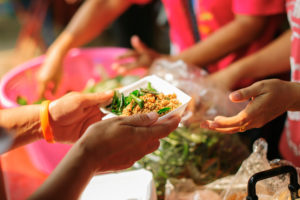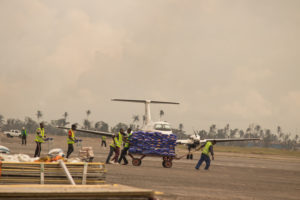Every year, August 19 marks World Humanitarian Day. I have always celebrated the “do-gooders” devoted to “protecting the lives of all humanity by any means necessary”. I always basked in awe and amazement at the “noble” workers fighting to protect the marginalized and oppressed. This year, as the great awakening transpired in response to worldwide protests for racial justice, I put on my critical thinking cap and began to explore the politics of humanitarian work.
Legally, in situations where humanitarian assistance is needed, the host state must consent to it. To break it down in layman’s terms:
If a state’s population is deprived of its rights to the basic necessities of food, water, shelter or healthcare, there is a moral and legal imperative for a state to seek and consent to humanitarian assistance in order to guarantee minimum essential levels of those rights.
In theory, this all sounds great; however, there have been instances where the citizens of states dealing with humanitarian crises find themselves in precarious situations where there is an overwhelming humanitarian need and the host state will not consent to the provision of humanitarian assistance. There are also many cases where consent is received and humanitarian agencies just barge right in with little to no understanding of how to truly address the long-term needs of the victims. In fact, the imagery that comes to mind is the use of forced unsuitable frameworks and connotations of the white saviour complex. I see a direct parallel between humanitarian response systems worldwide and the failed welfare systems in the US. Essentially they perpetuate all kinds of systemic injustices through its hegemonic forces.
As a Nigerian-American, born and raised in the U.S. I am very much privileged to be a product of these systems that were not built for me, or anyone who looked like me. I was purposefully put into white spaces, schools, extracurricular activities, etc. almost as a way to ensure that I would excel. I was often the only black person in my classroom or sports team, and it was one hell of a toxic ass experience to be constantly surrounded by folks who literally thought they were superior to me. One thing that I gained from these somehow both enriching, yet toxic experiences was a deeper understanding of the incessant abuses of power and privilege.

Within the world of humanitarian aid and international development, “solutions” often manifest into “dehumanization”. The racist roots of neoliberalism has manifested itself in the form of international development and aid. The bottom line is that racial injustices and aggression are not just locally against black Americans; state-sanctioned violence extends to the African continent.
Since U.S. Africa Command became fully operational in 2008, American troops have conducted more than 1,500 air attacks, commando raids, and other ground missions in Libya and Somalia alone. The result of a militaristic approach has been at the expense of innocent lives.; the hundreds of airstrikes and drone strikes have killed many civilians and resulted in a mass humanitarian crisis. The reality is that AFRICOM and its European allies seek to protect or exploit the continent for US and European interests, not African interests. This is the epitome of white supremacy.
Many people are not aware of how the US’ military presence drives insecurity and political and economic instability across the Sahel region. There is a direct correlation between these objectionable activities and the rise of terrorist groups like Boko Haram with powerful state interventions on the continent. On a macro level, we must make the link between the interlocking domestic repression of Black Americans, Europeans, the rest of the Global Black Diaspora, and US foreign interventions in Africa. We can’t allow ourselves to be deceived by the cynical and patronizing cry of “Black Lives Matter” that is being uttered by the same force that has supported the militarization of US police forces and the simultaneous expansion of the US military budget for the military recolonization of Africa through AFRICOM.
It’s complete moral hypocrisy and political contradiction to advocate for a “kinder and gentler” police force in the belly of the US empire while it is unleashing murderous violence around the world against Africans and other colonized people through its military. From supporting proxy wars to hundreds of airstrikes and drone strikes that kill civilians, humanitarian crises on the continent aren’t just a result of local forces. The set up of the UN model thrives on this power imbalance and for long those responding to the humanitarian crisis collaborated with who has power over which region. For long a humanitarian was white.
On a micro level, we really need to evaluate how we development practitioners can avoid inadvertent harm on the very population that we claim we are trying to help. My mentor and instructor, Stephanie Kimou, helped me put it into words today in her Decolonizing Development course. Oftentimes, we prioritize the commodification of black trauma as a communication strategy. The instrumentalization of black trauma is the main reason why humanitarian organizations fail miserably.
Many aid agencies, international non-governmental organizations (INGOs), and other humanitarian groups often compete with each other for funding. Consequently, they tend to refrain from sharing their programming plans and fail to engage the local communities in a participatory process that allows them to make plans using their own resources. “They can’t see the meetings, they don’t see the World Humanitarian Summit, they just see the white trucks that blaze into camp and then blaze back out again,” a Fulbright scholar shared from her experience at a refugee camp.
Imagine being afraid to leave the camp to look for work or supplies in a nearby town due to fear of missing out on aid delivery. The same thing happens to welfare recipients when they are too scared to take on a job that would deem them ineligible for government assistance because they earn $1 or $2 over the measly and unjustly defined poverty line limit.

The “Model” Humanitarian
Humanitarian aid is defined as material and logistic assistance to promote human welfare, often after natural or man-made disasters. Among the people in need are the homeless, refugees, and victims of natural disasters, wars, and famines. Most importantly, they’re human beings; individuals with their own inherent talents. No, they are not what the media typically refer to as “one giant moving mass of people”. They are doctors, teachers, lawyers, students, farmers, and the list goes on. Hence, we can’t just merely teach all the women and girls in the camps how to sew and make hair. The audacity!
We must grant all of these precious people the ability to combine their own skills and resources with aid to come up with a solution that’s right for them. The “model” humanitarian should merely sit back while the leaders of these groups conduct their own needs-assessments. Stop wasting taxpayer dollars to make you feel better! Stop giving people teddy bears if they want books or just basic access to proper healthcare and an avenue for self-sufficiency.
To my fellow development practitioners, the next time someone asks you how you can do better as a humanitarian- before you speak, check your privilege and examine why that question is loaded, and not able to be relegated to a few statistics. This topic requires robust socio-economic and political analysis to address the dynamics at play. A house divided against itself cannot stand.
The writer works with a development agency and wishes to remain anonymous
